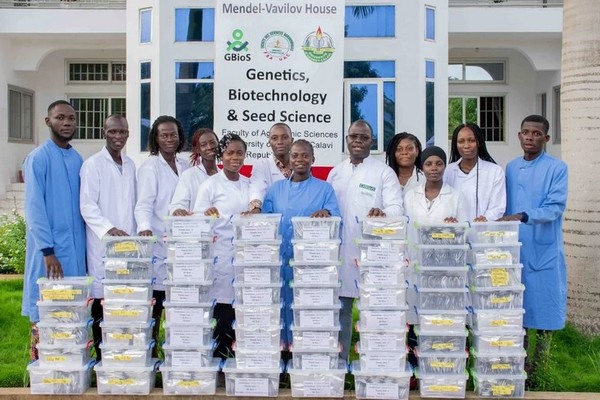The Svalbard Global Seed Vault welcomes shipments from five new depositors as the world's largest repository of crop diversity raises the number of samples in its care to 1.29 million during its second opening this year.
A total of 20,720 seed samples from 15 genebanks join hundreds of thousands of others stored in the snow-covered vault on the remote northern Norwegian island of Spitsbergen, where valuable collections of crop diversity are preserved to ensure that the world's agriculture is future-proofed for the benefit of all humanity.
Scientists and breeders rely on crop diversity conserved in genebanks to develop new varieties of crops that can withstand the effects of climate change. The seeds stored at the Seed Vault serve as a backup to collections held elsewhere.
For 16 years, the Svalbard Global Seed Vault has been steadily expanding its family of seed depositors, which back up their seed collections in case of unforeseen crises, such as war, civil strife, financial woes or natural disasters.
The Seed Vault operates through a partnership between the Norwegian Ministry of Agriculture and Food, the Nordic Genetic Resource Center (NordGen) and the Crop Trust.

Future and Climate-proofing Our Food System
Earlier this month, a survey of the world's leading climate scientists found that almost 80 percent of respondents expect at least 2.5 degrees Celsius of global heating above pre-industrial levels this century, well above the targeted threshold of 1.5 degrees set in the Paris Agreement on climate change.
But climate change is not a problem of tomorrow: unprecedented heat, drought and floods in southern Africa and elsewhere are already highlighting the dangers to food production due to a changing climate. Crop diversity – that can be saved in the form of seeds in genebanks, in addition to other methods – offers options so that plant breeders can develop new, more resilient, and productive varieties that are nutritious and delicious and adapted to local preferences, environments, and challenges.
Genebanks in Armenia, Benin, Indonesia and Malaysia join the Seed Vault's ranks of depositors for the first time thanks to the support provided by the Biodiversity for Opportunities, Livelihoods and Development (BOLD) project, a 10-year initiative launched in 2021. BOLD is funded by the Government of Norway to strengthen food and nutrition security worldwide through the conservation and use of crop diversity.
"Being a part of BOLD has been instrumental in advancing our conservation efforts," says Standy Christianto, Program Manager of Indonesia's Borneo Institute, which included rice varieties of great cultural significance to the Dayak people from Borneo among the 294 seed samples of rice, cowpea, eggplant and maize the NGO is backing up in the Seed Vault.
"[BOLD] has provided knowledge, resources, and networking opportunities that have strengthened our capabilities and impact in preserving genetic diversity for future generations," he said.
Four New Depositors Send Safety Duplicates
Besides the Borneo Institute, other first-time deposits come from the Agrobiotechnology Scientific Center of the Armenian National Agrarian University Foundation, which sent seeds of wild wheat varieties endemic to Armenia, and two institutions in Benin. The Laboratory of Genetics, Biotechnology, and Seed Sciences at the University of Abomey-Calavi and the Institut National des Recherches Agricoles du Benin (INRAB) are sending seeds of nationally important vegetables, cereals, and legumes. MARDI, Malaysian Agriculture Research & Development Institute, deposited seeds of different traditional rice varieties.
Nigeria's National Centre for Genetic Resources and Biotechnology (NACGRAB) expands its back-up collection with seeds of eight species, including sorghum, pearl millet and cowpea. NACGRAB is one of five African national partners in the Crop Trust's Seeds for Resilience project, which began in 2019 and is funded by the Government of the Federal Republic of Germany.
"It is so energizing to see how our support to genebanks, big and small, strengthens their efforts in safeguarding and making available the crop diversity we all need to adapt our agriculture to the unknown threats and challenges of tomorrow," says Stefan Schmitz, Executive Director of the Crop Trust.
"Safety duplication is a must, and it doesn't happen overnight. It is great to see old friends from CGIAR, such as the International Potato Center (CIP) and the International Center for Agricultural Research in the Dry Areas (ICARDA), adding to their back-up collections. We are proud to provide long-term support to these and many other genebanks; thanks to the generous support of our donors, this vital work continues. But there is still much to be done."
The largest deposits at today's opening come from the World Vegetable Centre (WorldVeg, based in Taiwan), followed by the National Agrobiodiversity Center (South Korea), and ICARDA (based in Lebanon).
World Food Prize Recognizes Seed Vault Visionaries
Today's opening comes just weeks after the announcement that two key figures involved in the creation of the Svalbard Global Seed Vault will receive the 2024 World Food Prize. On 9 May, the foundation that confers the award named Geoffrey Hawtin and Cary Fowler as this year's laureates in recognition of "their extraordinary leadership in preserving and protecting the world's heritage of crop biodiversity and mobilizing this critical resource to defend against threats to global food security."
Before the Seed Vault first opened its frosty doors in 2008, Fowler chaired the Norwegian government's committee—of which Hawtin was also a member—that assessed the feasibility of the proposed facility. Fowler then served for nine years as chair of the Seed Vault's International Advisory Council. Meanwhile, Hawtin helped develop the technical, management and policy specifications for the Seed Vault, which were used by the Norwegian government in its construction and operation.
"The seeds that are in there are the history of agriculture," Fowler said, according to the World Food Prize Foundation. "So, what they really represent is the experiences that our crops have had over twelve to fifteen thousand years."
Both men also played important roles in shaping the early years of the Crop Trust, with Fowler succeeding Hawtin in the top management position of the organization in 2004.
Source: croptrust.org
